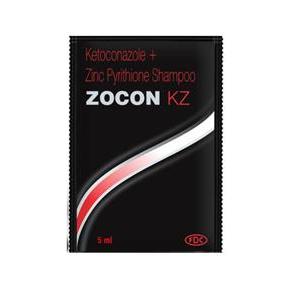FLUCONAZOLE + KETOCONAZOLE + ZINC PYRITHIONE
Fluconazole: Fluconazole is an antifungal medication that is used to treat various fungal infections. It belongs to a class of drugs called azole antifungals.
Fluconazole works by inhibiting the growth of fungi, thereby preventing the spread and proliferation of the infection. It does this by interfering with the synthesis of ergosterol, a crucial component of the fungal cell membrane.
The drug is commonly prescribed to treat yeast infections, such as vaginal candidiasis, oral thrush, and systemic candidiasis. It is also effective against certain types of fungal skin infections, such as ringworm and athlete’s foot. Additionally, fluconazole can be used as prophylaxis to prevent fungal infections in patients with weakened immune systems, such as those undergoing chemotherapy or organ transplant recipients.
The recommended dose of fluconazole varies depending on the type and severity of the infection. For vaginal candidiasis, a single 150-mg dose is often sufficient. For other types of infections, the usual dose ranges from 100 to 400 mg once daily. In severe infections or in immunocompromised patients, higher doses may be needed.
As with any medication, fluconazole can cause side effects. Common side effects include stomach upset, diarrhea, nausea, headache, and rash. In rare cases, more serious side effects can occur, such as liver damage, severe allergic reactions, and a decrease in white blood cell count. It is important to seek medical attention if any severe or persistent side effects are experienced.
It is worth mentioning that fluconazole can interact with certain medications, including blood thinners, some anticonvulsants, and certain cholesterol-lowering drugs. Therefore, it is essential to inform your healthcare provider about all the medications you are currently taking to avoid potential drug interactions.
Overall, fluconazole is a commonly used antifungal medication that is effective in treating various fungal infections. It is important to follow the prescribed dosage and guidelines provided by your doctor and report any concerning side effects promptly.
Ketoconazole: Ketoconazole is an antifungal medication used to treat infections caused by fungi or yeasts. It is available in various forms, including tablets, creams, shampoos, and foams.
Mechanism of Action: Ketoconazole works by inhibiting the synthesis of ergosterol, an essential component of fungal cell membranes. By disrupting the cell membrane structure, it inhibits the growth and reproduction of the fungi, leading to their eventual death.
Use: Ketoconazole is primarily used to treat various fungal infections, including:
1. Skin infections: Ketoconazole creams, shampoos, and foams are used to treat fungal infections such as athlete’s foot, jock itch, and ringworm.
2. Fungal nail infections: Ketoconazole tablets may be prescribed for the treatment of fungal infection of the nails that is resistant to topical treatments.
3. Systemic fungal infections: In some cases, ketoconazole may be used to treat more severe fungal infections that have spread to other parts of the body, such as the bloodstream or internal organs.
Dose: The dosage and duration of treatment will vary depending on the type and severity of the infection. It is important to follow the instructions provided by the prescribing healthcare professional or read the product label for proper dosage and usage guidance.
Side Effects: Common side effects of ketoconazole may include nausea, vomiting, abdominal pain, dizziness, headache, rash, itching, or allergic reactions. More serious but rare side effects may include liver damage, adrenal gland problems, or interactions with other medications.
It is important to consult a healthcare professional before using ketoconazole, as it may interact with certain medications or have contraindications for individuals with certain medical conditions, such as liver disease or adrenal gland disorders.
Overall, ketoconazole can be an effective medication for treating fungal infections when used properly and under medical supervision.
Zinc Pyrithione: Zinc pyrithione is an antifungal and antibacterial agent commonly used in the treatment of various skin conditions. It is available in the form of a cream, lotion, or shampoo.
Zinc pyrithione works by inhibiting the growth of fungi and bacteria. It does this by disrupting the metabolic processes required for their survival. The exact mechanism of action is not fully understood but is thought to involve interference with enzymes and proteins essential for microbial growth.
The recommended dose and duration of use may vary depending on the specific condition being treated. It is important to follow the instructions provided by healthcare professionals or included in the product labeling.
Some common side effects of zinc pyrithione include dryness, itching, redness, and mild skin irritation. These side effects are usually mild and temporary. However, if severe or persistent, it is advisable to seek medical attention.
In rare cases, allergic reactions can occur, characterized by severe skin irritation, rash, swelling, or difficulty breathing. If any of these symptoms occur, immediate medical attention is necessary.
It is important to note that zinc pyrithione is for external use only and should not be swallowed or applied to the eyes or mucous membranes. If accidental ingestion or contact with eyes occurs, it is important to rinse thoroughly with water and seek medical advice.
Overall, zinc pyrithione is an effective antifungal and antibacterial agent commonly used to treat various skin conditions. It is generally safe and well-tolerated, but it is always recommended to consult a healthcare professional before starting any new medication.

